Lesson 1
新概念英语第二册_lesson_1
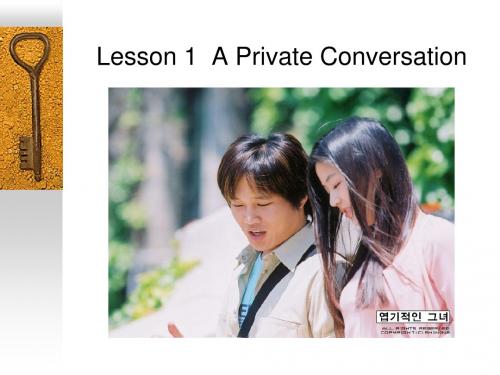
attention
[经典用法] pay attention to sb/sth
[比较学习]
notice
不用心去看 attention 用心去盯着 [口语应用] Attention, please! 请大家注意! Attention! 立正! At ease! 放松!
1. Last week I went to the theatre.
[参考翻译] 上个星期,我去了戏院看戏。
[语言点1] 时间状语开门见山,过去的时
间用过去时态顺理成章。故将go改为 went。 [语言点2] 在theatre,cinema,pictures等词 之前一定要加定冠词the。
3. The play was very interesting.
[参考翻译] 那场戏剧演得非常有意
思。 [语言点] very 为副词,interesting为 形容词,副词修饰形容词一般放在 其前面。 比如: very hot非常热, quiet easy 十分简单,但good enough 为例外。
with sb I had a long conversation with my father yesterday afternoon. have a conversation about sth Shall we have a conversation about your vacation ?
例如:
go to the theatre = go to the play去看戏 go to the cinema 去看电影(英式英语) go to the movies 去看电影(美式英语) go to the pictures/films 去看电影 be at the theatre/cinema 在戏院看戏/在
英语学习 Lesson1
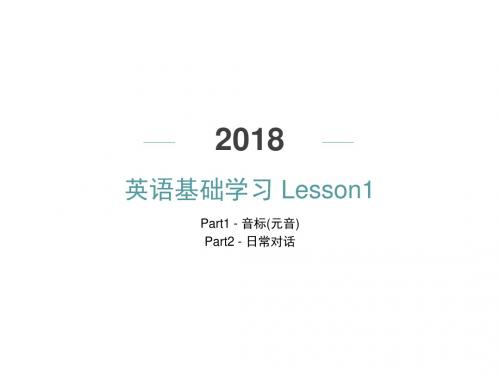
Part1 音标 - 双元音(饱满夸张)
合口双元音(第二组成部分为/ɪ/和/ʊ/): 1. [eɪ] A音:舌尖轻抵下齿,口型从半开到合 day [deɪ] 天,age [eɪdʒ] 年龄, pay [peɪ] 支付 2. [aɪ] I音:嘴型长大,发音饱满 eye [aɪ] 眼睛,like [laɪk] 喜欢,my [maɪ] 我的 3. [əʊ] O音:嘴型张开成圆形 old [əʊld] 老的,open ['əʊp(ə)n] 打开,cold [kəʊld] 冷的 4. [aʊ] 啊呜音:先张嘴成大圆 然后小圆 house [haʊs] 房子,now [naʊ] 现在,allow [ə'laʊ] 允许
8. [ʊə] 呜儿音:嘴型从微圆到张开 tour [tʊə] 旅游,sure [ʃʊə] 确信的,cure [kjʊə] 治愈
Part2 日常对话
• 名字:name • 工作:job
[neɪm]
[dʒɒb]
• 兴趣爱好:hobby
['hɒbɪ]
Part2 日常对话
1. 你叫什么名字? What’s your name? May I have your name, please? 1. 我的名字是Sherry. My name is Sherry.
2.你来自哪里? Where are you from? Where do you come from?
2. 我来自河南。 I am from Henan. I come from Henan.
Part2 日常对话
3. 你是做什么工作的? What’s your job? What do you do? 4. 你的兴趣爱好是什么? What’s your hobby?
lesson 1 课文翻译和词汇

brigade (n.): a group of people organized to function。。"unit in some work(组织起来执行某种任务的)队
scramble (v.): climb,crawl,or clamber hurriedly爬行;攀(登)
sanctuary (n.): a place of refuge or protection:asylum 避难所,庇护所 cedar (n.): any of a genus of widespreading coniferous trees of the pine family,having clusters of needlelike leaves,cones, and durable wood with a characteristic fragrance雪松(属)
和枕头给几个小一点的孩子。他想把全家人都集中在同一层楼上。"不要靠近窗户!"他警告说,担心在飓风巾震破的玻璃碎片会飞来伤人。风凶猛地咆哮起来?屋子开始漏雨了……那雨水好像能穿墙透壁,往屋里直灌。一家人都操起拖把、毛巾、盆罐和水桶,展l开了一场排水战。到八点半钟,电没有了。柯夏克老爹便启动了小发电机。
新概念1 lesson 1
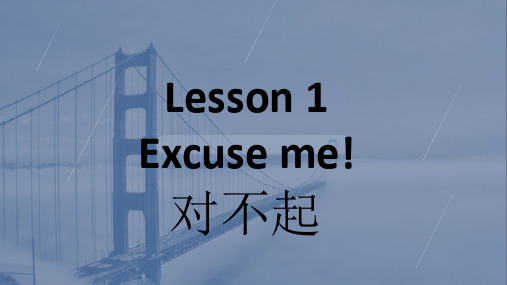
形容词性物主代词:表示一种所属关系。
对应汉语里面的“我的”“我们的”“你的”“你 们的”“ta的”“ta们的”
使用形容词性物主代词
你的短裙: your skirt 我的钢笔: my pen
Is this your handbag?
指示代词this:这,这里 th: [ð] 句型This is... :这是... e.g. This is a car. 这是一辆小汽车。
a lot: 非常地,十分地
Review
1. Excuse & sorry
2. handbag(失去爆破)
3. 人称代词主格,宾格,形容词性物主代词
主格
宾格
形容词性物主代词
I
me
my
we
us
our
you
you
your
he
him
his
she
her
her
it
it
its
they
them
their
4. This is.../ Is this...?
Is this your...? 这是你的...?
pen 钢笔 pencil 铅笔 book 书 watch 手表
dress 连衣裙 car 小汽车 house 二人称:you 第三人称:
he,she,it,they
宾格 me, us you
him,her,it,them
e.g. Glad to meet you.
ɡlad:adj.高兴的 [ɡlæd] Glad to [d] [t]失去爆破
pardon
int. interjection: 感叹词
int.原谅,请 常用在以下情况中: 再说一遍 有人跟你说话,你没
Lesson 1
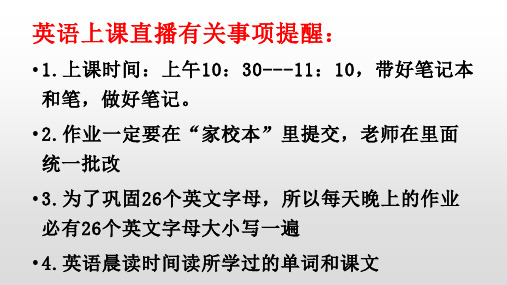
课堂小测
• 一、补全单词。
sh_ _ p co_ _ ig far_ e_
• 二、单项选择。
• ( ) 1. There are three ________.
• A. sheeps
B. a sheep
C. sheep
• ( ) 2. I have ________ apple.
• A. a
B. an
单词回顾
• farm 农场 • farmer 农民 • pig 猪 • cow 母牛:奶牛 • sheep 羊:绵羊 • a(an) 一;一个
在农场里
Li Ming:这是什么? Danny:它是一只绵 羊。 Danny:这是什么? Li Ming:它是一头 猪。
Homework(家庭作业) 1.26个英文字母一遍 2.所讲课文抄写两英一汉,并朗读
• ( ) 5. — Whis a cow.
• A. It’s
B. It
C. Its
• 三、判断下列句子与图片是(T)否(F)相符。
• ( ) 1. This is a farm.
( ) 2. This is a farmer.
•
• ( ) 3. It’s a sheep.
英语上课直播有关事项提醒:
• 1.上课时间:上午10:30---11:10,带好笔记本 和笔,做好笔记。 • 2.作业一定要在“家校本”里提交,老师在里面 统一批改 • 3.为了巩固26个英文字母,所以每天晚上的作业 必有26个英文字母大小写一遍 • 4.英语晨读时间读所学过的单词和课文
农场里的动物们
( ) 4. It’s a pig.
C. /
• ( ) 3. He is a ________.
Lesson 1 课文参考译文
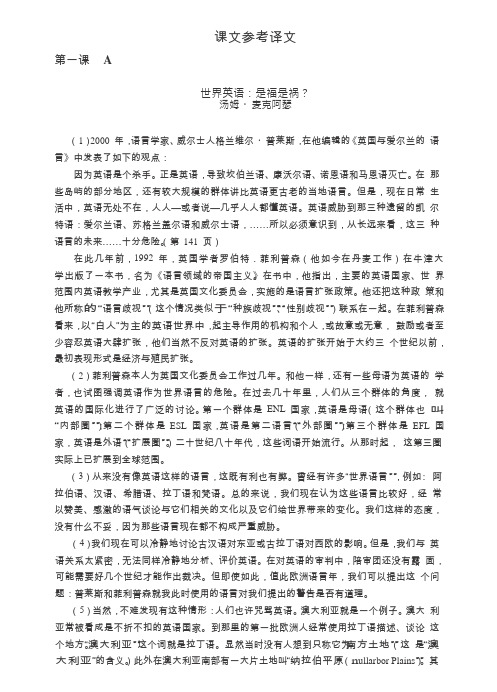
课文参考译文第一课A世界英语:是福是祸?汤姆·麦克阿瑟(1)2000 年,语言学家、威尔士人格兰维尔·普莱斯,在他编辑的《英国与爱尔兰的语言》中发表了如下的观点:因为英语是个杀手。
正是英语,导致坎伯兰语、康沃尔语、诺恩语和马恩语灭亡。
在那些岛屿的部分地区,还有较大规模的群体讲比英语更古老的当地语言。
但是,现在日常生活中,英语无处不在,人人—或者说—几乎人人都懂英语。
英语威胁到那三种遗留的凯尔特语:爱尔兰语、苏格兰盖尔语和威尔士语,……所以必须意识到,从长远来看,这三种语言的未来……十分危险。
(第141 页)在此几年前,1992 年,英国学者罗伯特.菲利普森(他如今在丹麦工作)在牛津大学出版了一本书,名为《语言领域的帝国主义》。
在书中,他指出,主要的英语国家、世界范围内英语教学产业,尤其是英国文化委员会,实施的是语言扩张政策。
他还把这种政策和他所称的“语言歧视”(这个情况类似于“种族歧视”、“性别歧视”)联系在一起。
在菲利普森看来,以“白人”为主的英语世界中,起主导作用的机构和个人,或故意或无意,鼓励或者至少容忍英语大肆扩张,他们当然不反对英语的扩张。
英语的扩张开始于大约三个世纪以前,最初表现形式是经济与殖民扩张。
(2)菲利普森本人为英国文化委员会工作过几年。
和他一样,还有一些母语为英语的学者,也试图强调英语作为世界语言的危险。
在过去几十年里,人们从三个群体的角度,就英语的国际化进行了广泛的讨论。
第一个群体是ENL 国家,英语是母语(这个群体也叫“内部圈”);第二个群体是ESL 国家,英语是第二语言(“外部圈”);第三个群体是EFL 国家,英语是外语(“扩展圈”)。
二十世纪八十年代,这些词语开始流行。
从那时起,这第三圈实际上已扩展到全球范围。
(3)从来没有像英语这样的语言,这既有利也有弊。
曾经有许多“世界语言”,例如:阿拉伯语、汉语、希腊语、拉丁语和梵语。
总的来说,我们现在认为这些语言比较好,经常以赞美、感激的语气谈论与它们相关的文化以及它们给世界带来的变化。
lesson 1
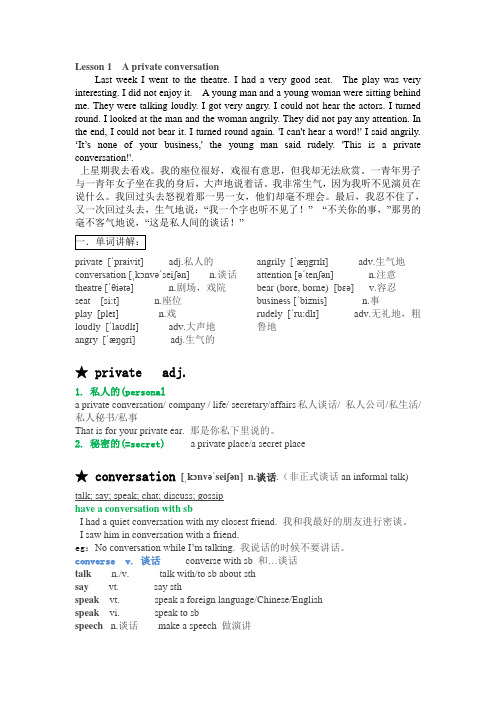
Lesson 1 A private conversationLast week I went to the theatre. I had a very good seat. The play was very interesting. I did not enjoy it. A young man and a young woman were sitting behind me. They were talking loudly. I got very angry. I could not hear the actors. I turned round. I looked at the man and the woman angrily. They did not pay any attention. In the end, I could not bear it. I turned round again. 'I can't hear a word!' I said angrily. ‘It’s none of your business,' the young man said rude ly. 'This is a private conversation!'.上星期我去看戏。
我的座位很好,戏很有意思,但我却无法欣赏。
一青年男子与一青年女子坐在我的身后,大声地说着话。
我非常生气,因为我听不见演员在说什么。
我回过头去怒视着那一男一女,他们却毫不理会。
最后,我忍不住了,又一次回过头去,生气地说:“我一个字也听不见了!” “不关你的事,”那男的毫不客气地说,“这是私人间的谈话!”private [ˈpraivit] adj.私人的conversation [ˌkɔnvəˈseiʃən] n.谈话theatre [ˈθiətə] n.剧场,戏院seat [si:t] n.座位play [pleɪ] n.戏loudly [ˈlaʊdlɪ] adv.大声地angry [ˈæŋɡri]adj.生气的angrily [ˈæŋgrɪlɪ] adv.生气地attention [əˈtenʃən] n.注意bear (bore, borne) [bɛə] v.容忍business [ˈbiznis] n.事rudely [ˈru:dlɪ] adv.无礼地,粗鲁地★ private adj.1. 私人的(personala private conversation/ company / life/ secretary/affairs私人谈话/ 私人公司/私生活/私人秘书/私事That is for your private ear.那是你私下里说的。
新概念英语第一册Lesson 1
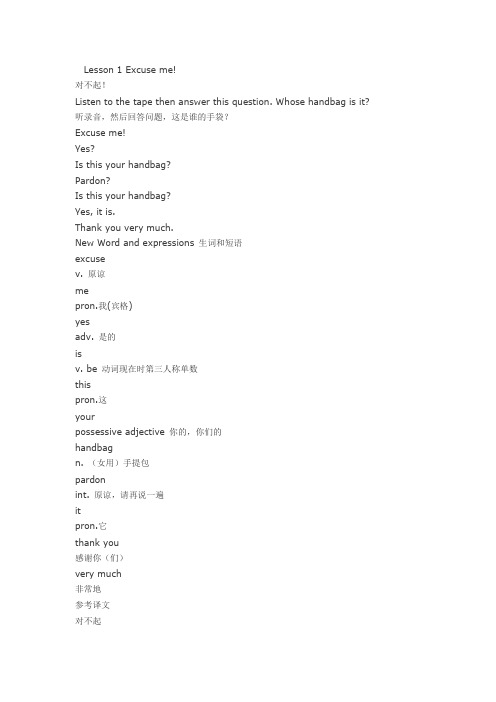
Lesson 1 Excuse me!对不起!Listen to the tape then answer this question. Whose handbag is it? 听录音,然后回答问题,这是谁的手袋?Excuse me!Yes?Is this your handbag?Pardon?Is this your handbag?Yes, it is.Thank you very much.New Word and expressions 生词和短语excusev. 原谅mepron.我(宾格)yesadv. 是的isv. be 动词现在时第三人称单数thispron.这yourpossessive adjective 你的,你们的handbagn. (女用)手提包pardonint. 原谅,请再说一遍itpron.它thank you感谢你(们)very much非常地参考译文对不起什么事?这是您的手提包吗?对不起,请再说一遍。
这是您的手提包吗?是的,是我的。
非常感谢!自学导读Excuse me!这是常用于表示道歉的客套话,相当于汉语中的"劳驾"、"对不起"。
当我们要引起别人的注意、要打搅别人或打断别人的话时,通常都可使用这一表达方式。
在课文中,男士为了吸引女士的注意而使用了这句客套话。
它也可用在下列场合:向陌生人问路,借用他人的电话,从别人身边挤过,在宴席或会议中途要离开一会儿等等。
2.Yes?什么事?课文中的Yes?应用升调朗读,意为:"什么事?"Yes?以升调表示某种不肯定或询问之意,也含有请对方说下去的意思。
3.Pardon?对不起,请再说一遍。
当我们没听清或没理解对方的话并希望对方能重复一遍时,就可以使用这一表达方式。
较为正式的说法是:I beg your pardon.I beg your pardon?Pardon me.它们在汉语中的意思相当于"对不起,请再说一遍"或者"对不起,请再说一遍好吗?" 4.Thank you very much.非常感谢!这是一句表示感谢的用语,意为"非常感谢(你)"。
- 1、下载文档前请自行甄别文档内容的完整性,平台不提供额外的编辑、内容补充、找答案等附加服务。
- 2、"仅部分预览"的文档,不可在线预览部分如存在完整性等问题,可反馈申请退款(可完整预览的文档不适用该条件!)。
- 3、如文档侵犯您的权益,请联系客服反馈,我们会尽快为您处理(人工客服工作时间:9:00-18:30)。
Lesson 1 周一2015/12/28 Nancy and Tina1 问候用语GreetingsHello/hi/Good bye/ Byebye/see you laterGood morning/afternoon/eveningHow are you today=(How are you doing?)--I’m fine, thank you./I’m very well.How do you do?--How do you do?Nice to meet you!--Nice to meet you, too.Excuse me!Yes?Pardon? = I beg you pardon?Here you are!Catch2 介绍自己My name is XX, I’m XX years old, I’m a teacher, and I’m Chinese.(I come from China)P104-108 对应的问句:What’s (what is) your name?How old are you?What is your job?/what are you?What is your nationality?3 介绍他人/物品This is Miss/Mrs/Mr 姓, she is 25 years old, she is a teacher and she is Chinese.Here/This is my hat, it is black.一般疑问句:Is this XX?Yes,it is/no, it isn’t / no, it is not my XX. (将Be动词提到句首)问句:what color is it?4 重点语法练习P12 P16 P201)Be 动词的变化I amYou areHe/she/itThey/we/you are2) 形容词性物主代词变化I-my, you-your, he-his,she-her,it-its,we-our, they-their5 Practice P24 P281)Is this your/my/his/her handbag/pen/pencil/book/watch/coat/dress/skirt/shirt/car/house/ umbrella/ticket/suit/school/?2)This is my sister/brother/father/mother/grandmother/grandfather/uncle/aunt/son/daughter3)He is Chinese/Japanese/French/German/Korean/English/American/Italian4)I am/he is a policeman/taxi driver/postman/nurse/mechanic/hairdresser/housewife5) 词组look at that +形容词+人Look at that fat/thin/tall/short/dirty/clean/old/Young/busy/lazy/smart/lovely/hard-working woman.6)My shirt is red,yellow,white ,black ,pink,blue,orange,green,gray.Lesson 2 2015/12/29 周二7-8:30 Nancy&Tina1 your passports please! (主谓一致)Are these your cases? / Is this your case?Yes, they are/ No, they are not=they aren’tOur cases are brown.They are thirsty/tired/light/heavy/long/small/big/2 what’s the matter? Are you all right now?3 名词变复数1)一般情况下,直接加s:officers,girls.friends,passport,tourist,employees,assistant2).以s、sh、ch、x结尾的名词,加es,如:bus-buses,class-classes,watch-watches,box-boxes,glasses3).y结尾的名词,有两种:直接加s,boy-boys,toy-toys;去y改ies,family-families,strawberry-strawberries.4).以f或fe结尾的名词,去f或fe改ves,如:housewife-housewives,knife-knives,wolf-wolves (这三个词的记忆口诀---“妻子”拿着“小刀”杀了“狼”)5).以”o"结尾的名词:(1)有生命的,加es,如:potato-potatoes,tomato-tomatoes,hero-heroes (这三个词的记忆口诀---”英雄“爱吃”土豆“和”西红柿“)(2)无生命的,加s,如:photo-photos,radio-radios.6).不规则变化的名词:man-men,woman-women,policeman-policemen,policewoman-policemen child-children, mouse-mice3 a/an P32 国际音标常见字母组合的发音4 Give me XX, which XX/one? 人称代词宾格:I-me, you-you, he-him,she-her,they-them,we-us. P 48Give me/you/him/her/them/us the empty/full/full/large/little/sharp/bluntbox/glass/cup/bottle/knife/fork/spoon5 Practice P32 P36 P40 P44Lesson 31 There is a refrigerator in the kitchen.There is a table in the middle of the room.There is a cooker on the table.There is a picture on the wall.There are some magazines on the televisionThere are some newspapers on the on the floorThere are some books one the stereo练习:P55-562 a/theThere is a cup on the table/the cup is clean.3 what must/should/can/ I do? P60Open your suitcase/Shut your mouth (身体部位:foot head face hair nose eye ear arm hand leg) Put on/take off your skirt/shoes/tieTurn on/turn off the light/tapSweep the floorClean/dust the room/deskEmpty the bottleRead this newspaper3 Where is my book? It is on the tableWhere is Nancy? She is in the garden4 what is she/he it doing? P64P66P68She is sitting under the treeHe is climbing the treeIt is running across the grass/it is running after a cat.What are they doing?They are walking over the bridgeMr Li and his wife are looking at the clouds in the sky.They are cooking/sleeping/shaving/crying/washing/flying/waiting/jumping动词的现在分词变化规则1.一般在词尾加“-ing”:climb-climbing,eat-eating,look-looking,read-reading,clean-cleaning2.以e结尾的词,先去e,再加“-ing”例如:type-typing,make-making,take-taking3. 以重读闭音节结尾,末尾只有一个辅音字母的词,要双写这个辅音字母,然后再加ing. Run-running, cut-cutting,shut-shutting,put-putting.Lesson 41 介词用法P71Our village is between two hills. (on , in , in the middle of,under, across)The tree is on the left/right of the house.The table is near the bed.We are waking along the river.The school building is besides a park.2 what are you going to do? (与现在进行时的区别P75)I’m going to paint itI’ m going to shaveI’m going to wait for a busWe’re going to do our homework3 练习:P79what are you going to do with that/those?I’m going to give/show/send/take...4 不可数名词someA pie of cheese/ a loaf of bread/a bar of soap/ a bar of chocolate/ a bottle of milk/ a pound of sugar/ a tin of tobacco(Water,sugar,milk,tea,juice,hair,coffee,bread,rice,chocolate,grass,paper,money,rain,soup,meat,beef ,fish,pork,chicken,toast,rice,food,news,)5 there is a spoon on the table. P84Is there a spoon on the table? Yes, there isThere is some water in the bottle.Is there any milk in the bottle? No there isn’tAre there any bottles on the table?6 Can you come here a minute? 练习P91Can she type this letter for me?I can’t type this letter!I can’t read it!7 Do you want any sugar? Yes, I do/No, I don’t P96P98食物单词Do you like coffee? Yes, I do/No,I don’t。
